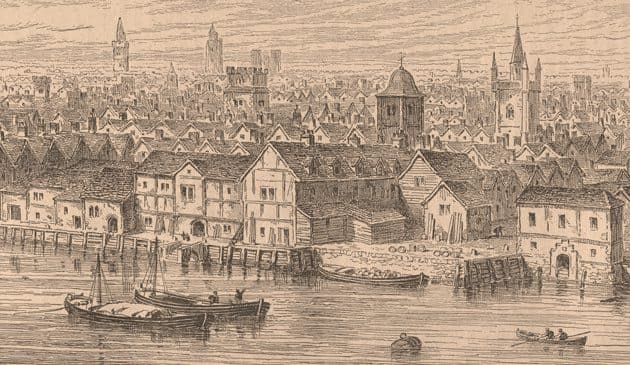Why were wives in medieval London once forbidden from beating their husbands after 9 PM
In medieval London, a wife's right to beat her husband ended abruptly at 9 PM, and the bizarre reason for the curfew had nothing to do with his safety.


Too Long; Didn't Read
TLDR: The rule was about noise, not assault. In medieval London, a city-wide curfew after 9 PM required quiet. A loud domestic fight, regardless of who started it, was forbidden because it disturbed the neighbors, not because wife-on-husband violence was acceptable before then.
The 9 PM Curfew on Chaos: Why Were Wives in Medieval London Once Forbidden From Beating Their Husbands After 9 PM?
Imagine the dimly lit, narrow streets of medieval London. As the church bells toll the ninth hour, a watchman’s voice cries out, "All's well!" This was the signal for the city to settle into a mandatory quiet. Fires were banked, taverns shuttered, and the peace of the night was meant to be absolute. It is within this world of strict curfews and public order that one of history’s most peculiar bylaws emerges: a rule that seemingly forbade wives from beating their husbands after 9 PM. But was this an early, oddly specific domestic violence law? The truth is far more revealing about medieval society. This post will explore why this fascinating rule existed, revealing it was less about protecting husbands and more about protecting the city's peace and rigid social order.
A Breach of the Peace, Not Just a Marriage
The notion of a wife being fined for beating her husband sounds like a strange historical footnote, but records from 15th-century London do indeed reference such ordinances. However, to understand them, we must look past our modern interpretations of law. This rule was not primarily concerned with the welfare of the husband or the dynamics within a marriage. Instead, it was fundamentally about preventing a public nuisance.
In medieval England, a person's home was not the private castle we consider it today. Houses were packed together, walls were thin, and the line between private life and public concern was blurry. A loud argument, especially a physical one, was not a private matter—it was a disturbance. The legal system was deeply invested in preventing "affray" and any disruption that could upset the community. A violent domestic quarrel that spilled out into the street, aurally or otherwise, was considered a breach of the king's peace, and the authorities would intervene.
The Curfew Bell: Why Night-Time Noise Mattered
The specific timing of the 9 PM curfew is the most crucial piece of the puzzle. Medieval cities were noisy and chaotic during the day, but at night, authorities enforced a strict peace. The curfew, signaled by the "curfew bell," was a critical tool for maintaining control and safety. Once it rang:
- All work and public activity ceased.
- Taverns and alehouses had to close.
- Citizens were expected to be indoors and quiet.
The city watch patrolled the streets to enforce these rules. Any noise—be it a drunken song, a brawl, or a heated domestic dispute—was a direct violation of the curfew. The law against a wife beating her husband after this hour was, therefore, a form of noise-abatement legislation. The act of beating was likely to involve shouting, screaming, and the thud of blows, all of which would disrupt the slumber of neighbors and challenge the authority of the watch. The offense wasn't the beating itself, but the loud beating after hours.
The 'Unnatural' Act: Gender Roles and Public Shame
While noise was the primary legal trigger, the specific mention of wives beating husbands points to a deeper social anxiety. Medieval society was built on a strict patriarchal hierarchy. The husband was the head of the household, divinely ordained to rule over his wife and children. A wife physically assaulting her husband was seen as a shocking and "unnatural" inversion of this social order.
This act was considered a profound source of public shame, not just for the husband, but for the entire community, as it signified a breakdown in the fundamental structure of society. While the law permitted a husband to use physical "correction" on his wife (within certain limits), the reverse was unthinkable and scandalous.
Punishments for women deemed "unruly" or "scolding" were often public and humiliating, such as being paraded in a "scold's bridle" or dunked in a river on a "cucking-stool." The law against post-curfew beatings was part of this same social mechanism. It aimed to suppress behavior that was not only noisy but also dangerously subversive to the established gender roles of the era.
Conclusion
Ultimately, the medieval London law forbidding wives from beating their husbands after 9 PM was not a quirky forerunner to modern domestic abuse legislation. It was a pragmatic rule born from the unique conditions of city life in the Middle Ages. This single ordinance was a fascinating intersection of three key medieval concerns: the absolute need for public order, the strict enforcement of a city-wide curfew, and the powerful desire to uphold a rigid patriarchal hierarchy. It serves as a powerful reminder that when we study history, the "why" behind a law is often far more illuminating than the "what," revealing the deepest values and anxieties of the world that created it.


